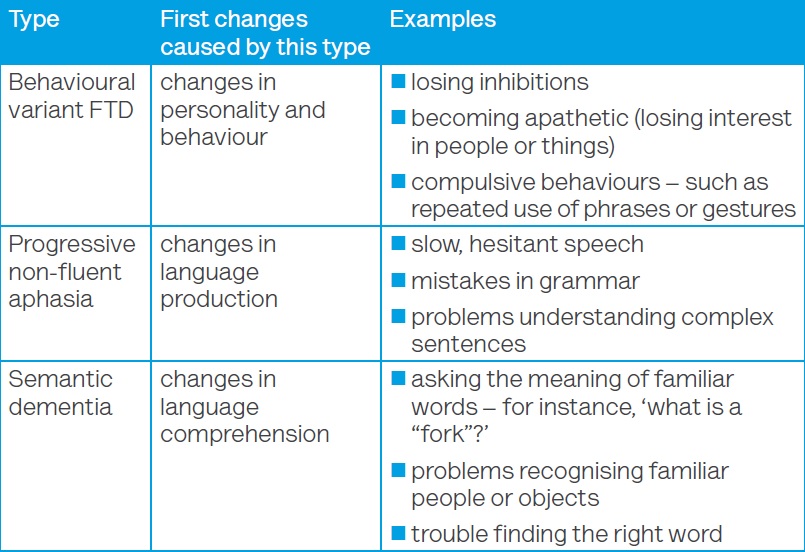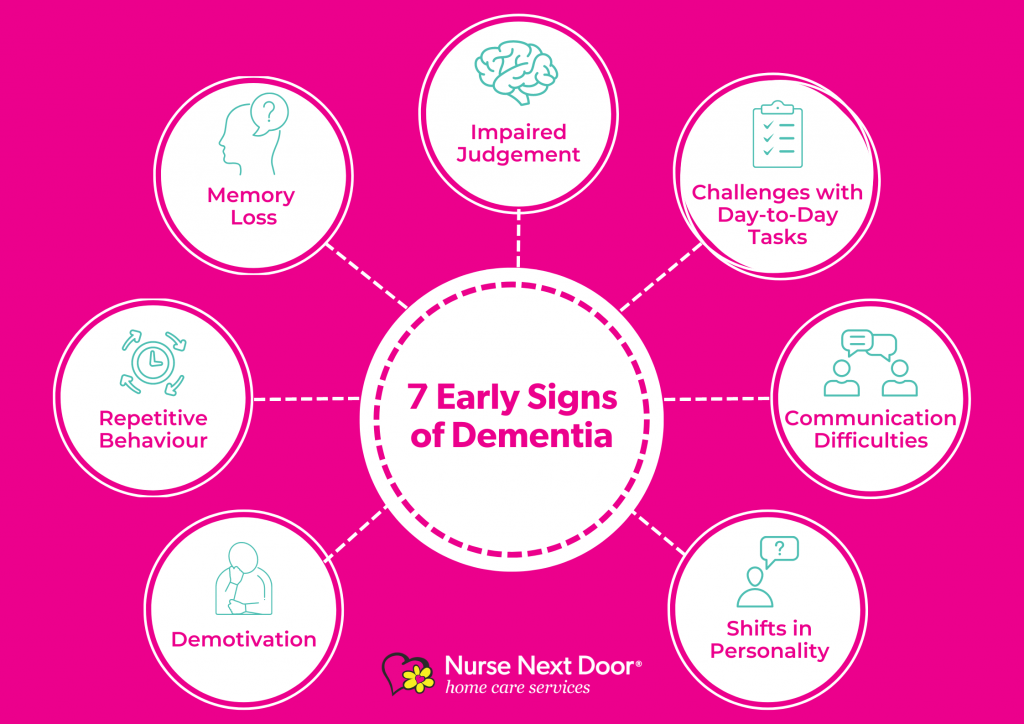Coping Strategies for Families Facing Frontotemporal Dementia
Coping Strategies for Families Facing Frontotemporal Dementia
Blog Article
Comprehending the Influence of Mental Deterioration on Life and Caregiving
Mental deterioration influences life in profound methods, influencing not just those detected however likewise their caretakers. As cognitive decline proceeds, you may notice adjustments in interaction and routine that obstacle both events. Recognizing these shifts is necessary for keeping self-respect and interaction. Just how do you adapt your caregiving strategies to support somebody traversing this complicated trip? The responses could amaze you as we discover the subtleties of this experience.
The Phases of Dementia and Their Effects on Day-to-day Live
As you navigate the trip of mental deterioration, understanding its stages can noticeably affect exactly how you take care of day-to-day life. Mental deterioration normally advances with 3 major phases: early, center, and late.
During the center phase, you'll experience extra noticeable cognitive decrease. Daily jobs may end up being challenging, and maintaining your independence might need modifications. Using pointers and streamlining your atmosphere can assist.
In the late phase, people commonly require considerable support with daily tasks. Preparation for care becomes essential, concentrating on convenience and high quality of life. By understanding these phases, you're much better geared up to respond proactively, guaranteeing you or your liked one can navigate the obstacles with dignity and grace.

Modifications in Interaction and Social Communication
Just how do adjustments in communication impact your everyday interactions as dementia advances? As mental deterioration developments, you may see that basic conversations become tough. Words might leave you, or you might battle to locate the right phrases. This can result in stress for both you and your loved ones. Nonverbal cues, like gestures or faces, come to be significantly vital.
You may find it much easier to attach with these ways as opposed to counting only on talked language. Listening skills can also change; you might discover it harder to comply with discussions or bear in mind what was simply stated (Fall Risk). This can cause misunderstandings or sensations of isolation
Urging persistence and developing a helpful setting can assist. Engaging in tasks that foster connection, like songs or art, can improve social communications. Keep in mind, keeping relationships is still feasible; it's just about adjusting to new methods of interacting.
Influence On Daily Routines and Activities
While steering daily regimens, you'll likely observe that tasks you once completed easily come to be more difficult as mental deterioration proceeds. Simple activities like cooking, dressing, or perhaps showering might call for even more effort and time. You might discover yourself failing to remember action in acquainted regimens or battling to recall where you placed items. This can result in aggravation not just for you, however likewise for those around you.
Adjusting your setting can assist; for circumstances, identifying items or making use of lists can simplify jobs. Engaging in recurring, organized activities can additionally supply comfort and a feeling of success. Keep in mind, it's okay to ask for aid.
Behavior and emotional Challenges
Steering with daily regimens can cause not just sensible obstacles, yet also emotional and behavioral ones. You might observe changes in mood, such as raised stress and anxiety or irritation, which can stem from complication or trouble in completing jobs. As you browse these moments, it is crucial to recognize that your liked one might express their feelings via behaviors like anxiety or withdrawal.
These psychological responses can be unforeseeable and might arise without warning, leaving you both sensation overwhelmed. You may find that familiar atmospheres or regimens can help decrease anxiousness, but maintaining perseverance becomes considerable. It is necessary to confirm their feelings, even if you do not fully comprehend them.
The Duty of Caregivers in Supporting People With Mental Deterioration
As a caregiver, you play an essential duty in giving emotional support for people with dementia. Establishing day-to-day care regimens can develop a feeling of security and comfort, assisting to alleviate their anxiousness. By understanding their needs and utilizing efficient strategies, you can significantly improve their quality of life.
Emotional Support Strategies
When taking care of someone with dementia, recognizing the emotional landscape is necessary for providing efficient assistance. You'll often find that patience and empathy go a long means. Verify their sensations; if they share confusion or irritation, recognize it without dismissing their feelings. Simple motions, like holding their hand or preserving eye get in touch with, can create a sense of safety and security. Try to take part in activities that they enjoy, as this can trigger happiness and connection. Remember to communicate plainly and gradually, utilizing a calm tone. Encourage expression via songs or art, which can act as a powerful electrical outlet. Eventually, don't neglect to care for your own psychological requirements; looking for support for yourself can boost your capacity to care for them.
Daily Treatment Routines
Establishing day-to-day care routines is essential for supplying security and comfort to individuals with mental deterioration, as these routines can assist lower confusion and stress and anxiety. You can begin by describing a regular routine for dishes, tasks, and rest. This predictability assists your enjoyed one feel much more safe and secure and engaged.
Integrate acquainted jobs, like folding laundry or watering plants, which can evoke favorable memories and cultivate a sense of achievement. Usage visual hints, such as checklists or calendars, to lead them through the day.
Be adaptable, though; adjust routines as needed based on their mood or power degrees. Frontotemporal Dementia. Bear in mind, your patience and understanding are important in navigating their transforming demands, guaranteeing they feel supported and valued throughout their everyday life
Producing a Safe and Comfy Living Setting
Developing a comfortable and risk-free living atmosphere is crucial for individuals with dementia. You'll intend to make home security alterations that reduce threats and assure knowledge to give a feeling of convenience. By concentrating on these elements, you can assist produce an area that supports both safety and well-being.
Home Safety Modifications
As you navigate the obstacles of dementia, making home security modifications can substantially enhance convenience and safety and security. Tag essential locations, such as the bathroom and kitchen area, with clear indicators to help with positioning. These modifications not only advertise safety however additionally encourage self-reliance, allowing your enjoyed one to feel more at ease in their atmosphere.
Convenience and Familiarity
After making sure a safe setting with necessary adjustments, cultivating comfort and knowledge is vital for individuals with mental deterioration. Begin by personalizing their room. Use familiar colors, decors, and photos that evoke delighted memories. A favorite blanket or chair can provide a feeling of safety. Maintain a knockout post a constant regular to help them feel based and reduce stress and anxiety. Straightforward, acquainted meals can additionally develop a calming atmosphere. Maintain pathways clear and clutter-free to prevent confusion. Integrate soft lighting, as bright lights can be disorienting. Think about adding relaxing fragrances, like lavender, to promote relaxation. Taking part in familiar activities, such as listening to music or horticulture, can boost their feeling of belonging, making their living setting a real shelter.
Methods for Effective Caregiving and Assistance
While steering the difficulties of mental deterioration treatment can feel frustrating, carrying out effective approaches can considerably enhance both the caretaker's and the individual's daily experience. Beginning by establishing a regimen; predictability assists decrease anxiousness for both you and your loved one. Usage clear, easy interaction-- straight concerns and brief sentences can avoid confusion.

Don't neglect to look after yourself; routine breaks and link with support system. Sharing experiences with others in similar situations can supply beneficial understandings and emotional alleviation.
Last but not least, stay patient and flexible. Mental deterioration can bring unforeseeable modifications, so adjusting your technique is crucial. By using these methods, you can promote an extra favorable environment that profits both you and your liked one.
Regularly Asked Concerns

What Are the Different Sorts Of Dementia?
You'll discover several types of dementia, including Alzheimer's, vascular mental deterioration, Lewy body mental deterioration, and frontotemporal mental deterioration. Each kind impacts memory and cognitive function in a different way, so recognizing the differences is necessary for appropriate medical diagnosis and care.
How Can I Help Someone With Early-Stage Mental Deterioration?
You can aid a person with early-stage mental deterioration by being individual, using assistance, and motivating them to take part in activities they enjoy. Maintaining routines constant and maintaining open communication can also make a substantial distinction in their every day life.
Are There Financial Resources Available for Mental Deterioration Treatment?
Yes, there are funds readily available for dementia care. You can explore entitlement program programs, nonprofit organizations, and insurance policy choices. It's also a good idea to get in touch with regional firms for certain resources see customized to your situation.
What Lawful Considerations Should Caregivers Know?
As a caretaker, you ought to take into consideration power of attorney, medical care proxies, and guardianship legislations. It's important to recognize the legal civil liberties and obligations you hold, guaranteeing your liked one obtains proper care and security.
How Can I Deal With Caregiver Stress And Anxiety?
You can deal with caretaker stress and anxiety by prioritizing self-care, looking for support from buddies or teams, setting practical expectations, taking breaks, and exercising relaxation methods. Remember, your wellness matters just as high as the person you're looking after.
Comprehending the Impact of Dementia on Daily Life and Caregiving.
As you navigate the trip of dementia, comprehending its phases can substantially impact just how you manage day-to-day life.While maneuvering everyday regimens, you'll likely discover that jobs you as soon as completed effortlessly come to be a lot more challenging as mental deterioration proceeds.Developing everyday care regimens is important for supplying security and comfort to individuals with mental deterioration, as these routines can assist reduce confusion and anxiety.While steering the challenges of dementia treatment can feel overwhelming, applying effective approaches can substantially improve both the caregiver's and Visit This Link the individual's everyday experience.
Report this page